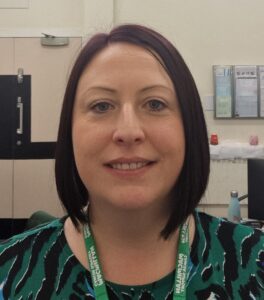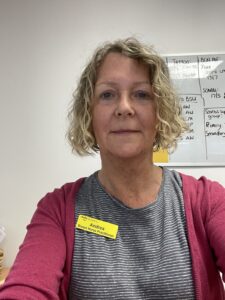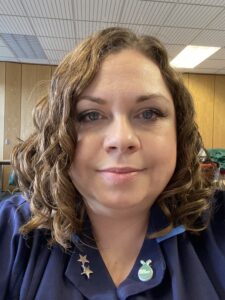Cancer Clinical Nurse Specialists (CNS) play a vital role for people with cancer, supporting them to navigate services, explaining treatment plans, listening to people’s needs and preferences and being their advocate.
Wednesday 26th April is National Cancer Clinical Nurse Specialist Awareness Day.
Here you can meet some of the CNS’s that are helping to care for people affected by cancer across Humber and North Yorkshire, as well as finding out more about some of the special online events planned for the day.
Ceri Fuller, Cancer Clinical Nurse Specialist, Living with and Beyond Cancer Team, Castle Hill Hospital, Hull – Hull University Teaching Hospitals NHS Foundation Trust
Rachel Walker, Lead Breast Care Nurse, Macmillan, Northern Lincolnshire and Goole NHS Foundation Trust
I have worked for the NHS for 17 years and have worked in breast care for most of my career. It has given me some pretty awesome opportunities along the way, and I have met some truly inspirational people.
What does your role involve?
My role is to provide support to patients and their family from the point of diagnosis and during their active treatment.

I see myself as a spare pair of ears when the patient is unable to take in all the information. I prepare patients for their treatments and support those for whom treatment is not an option. I am there to decipher medical jargon and to listen to a patient’s worries and concerns, supporting them the best I can and signposting to relevant support where appropriate. Most importantly I am the patients advocate, being the patients voice at a time where they may feel vulnerable or bewildered in this new world that is full of hospital appointments and cancer care.
Breast cancer is so common that most people diagnosed will know someone else who has been through it at some point in their lifetime. Treatments can be complex and not one size fits all so sometimes we need to explain why a patient is not having the same treatment as one of their friends or relatives.
Another element of my role is keeping up to date with current practice and supporting the doctors and other colleagues in their roles. I am involved in governance and writing policies for the trust as well. No day is the same but that is why I enjoy what I do.
What is the best part of your job?
I think the CNS role is a special one, so it is hard to really identify one best bit, but I can say that working with the patients and their families is very rewarding and is up there with one of the best parts of my role.
The team I work with are excellent and are more like my family than a team. No matter how difficult a day may get, we are all there to support one another. Working with such a diverse range of professionals certainly has its advantages and has really helped extend my knowledge within breast cancer care.
What does caring for people affected by cancer mean to you?
For me is knowing you have made a difference to the patients, either by answering a question about their treatment, or being there at an appointment to offer your support.
Support comes in many different shapes and sizes and each patient will need a varying amount of it. If I can go home and feel I have done a good job and helped someone, then that Is a good day.
What would you say to anyone considering a nursing career in cancer care?
I would recommend anyone wanting to be a CNS takes the leap once they have a good baseline and knowledge set. There is an awful lot of support and opportunities available to build on your existing knowledge and progress within your chosen speciality. It is also great to know that you have made a difference to a patient their family and helped them get through such a difficult time.
Andrea Ward, Macmillan Breast Care Nurse Specialist Team Leader, York and Scarborough Teaching Hospitals NHS Foundation Trust
I have worked for the NHS since 1981 when I started my training in London. I simply wanted to help people and have absolutely loved being a nurse and would do it again in a heartbeat.
What made you become a CNS?
I was ready for a change and to progress, I wanted a role that fit in with my young family and I also wanted to specialise in a certain area and remain fully patient focussed.

What does your role involve?
I work in a combined role as a Nurse Practitioner and Breast Care Nurse. I am also the Team Leader for the Breast Cancer Clinical Nurse Specialist Team at York and Scarborough Teaching Hospitals NHS FT.
I am an integral member of the breast multi-disciplinary team and work closely with my colleagues in assessing, supporting, educating and caring for patients from prior to diagnosis to the end of treatment and beyond. Day to day, I work in clinics, assessing patients, requesting investigations and communicating the results to the patients.
As a team we all have differing skills and specialisms and we hope we offer a fantastic level of care to all our patients.
I also manage the day to day running of the team with help from our Service Manager and try to support them to develop fully in what can be a stressful role. I am always full of new ideas and plans to improve and develop the service
What is the best part of the job for you?
Still being able to engage with and support patients and their carer’s. Plus working as part of the best possible team of colleagues. Although it can be stressful and sad at times, I am always happy to come to work.
What difference do you feel you make to people living with cancer?
I hope I can get alongside patients at such a stressful time, share my specialist knowledge and support them throughout their time under our care.
What would you say to anyone who is considering a nursing career in cancer care?
Do it! It is the most amazing job. You get to work at an advanced level and still be working with patients. There is always something new to learn and you will be fully supported to develop.
Sarah Berwick, Macmillan Advanced Lung Cancer Clinical Nurse Specialist and Manager of the Lung Cancer Clinical Nurse Team at York Hospital
I have worked on and off in the NHS for the last 20 years and I have been a Lung Cancer Clinical Nurse Specialist (CNS) for the last 10 years.
I didn’t finish my training until I was thirty, so a bit older than most new qualified nurses but having more life experience really helped me in my training and later in my career.
What made you become a CNS?

From early on I wanted to be a specialist nurse specifically with an interest in palliative care or lung cancer. Looking after cancer patients puts us in an extremely privileged position especially as you are caring for people at their most vulnerable and when they need a person to trust and rely on to navigate and support them through their cancer journey.
Throughout my career I focused on gaining experience and knowledge and this meant working in both respiratory medicine and palliative care. This experience enabled me to have the right skills to become a Lung Cancer Clinical Nurse Specialist.
What does your role involve?
Over the last 10 years my job has change beyond recognition but at the core the focus has always been supporting lung cancer patients.
One of the main skills for a cancer nurse is excellent communication skills and the ability to be flexible and adjust to a rapidly changing working environment. We first meet and support patients and their families at diagnosis and from that point our role can vary.
We can offer holistic care and personalised care planning, provide symptom management and health education for patients, as well as a wide range of advice and support as required. We can also be a patient advocate and a direct contact within the hospital and can refer patients to other services as needed.
We have highly specialist knowledge and play a core role in the multi-disciplinary team and contribute to improving standards of care across the pathway, as well as educating other health care professionals. Our role is constantly expanding and changing which makes this job so interesting.
What is the best part of the job for you?
The best part of my job has to be the patients, they constantly keep us on our toes, and I love that about them. I enjoy talking and listening to our patients but there is no better feeling than being told by someone that they feel better after speaking to me. I love my job today as much as I did 10 years ago, and it is constantly challenging and rewarding at the same time.
I am surrounded by the most amazing team, they make coming into work so enjoyable every day. They are all very supportive of me and each other and we all share the same goals and values what more can you ask for?
What would you say to anyone who is considering a nursing career in cancer care?
If people are thinking about nursing specifically going into cancer nursing or palliative care, you need to be resilient there will be many sad and emotional times, this can often take its toll on people’s wellbeing. Taking this all into consideration and if you are prepared for that cancer nursing can be the most rewarding job in the world.
Clinical Cancer Nurse Specialist Awareness Day Special Events
Breakfast webinar
A breakfast webinar is being held on 26th April between 8am and 9am to showcase and celebrate the dedicated Cancer Clinical Nurse Specialist workforce. The event will showcase best practice in developing the Cancer CNS workforce and encourage important discussion and reflection on this vital role. A full agenda and guest panel will be announced shortly. Register your interest here.
Tweetchat
Save the Date and Join the Discussion! A TweetChat will be held on Twitter on 26th April between 4-5pm to celebrate the role of the Cancer Clinical Nurse Specialist (CNS). More information to follow.
